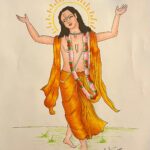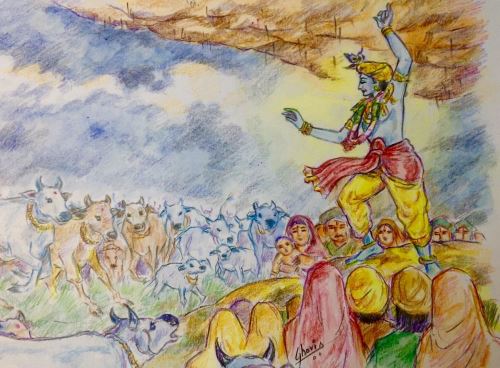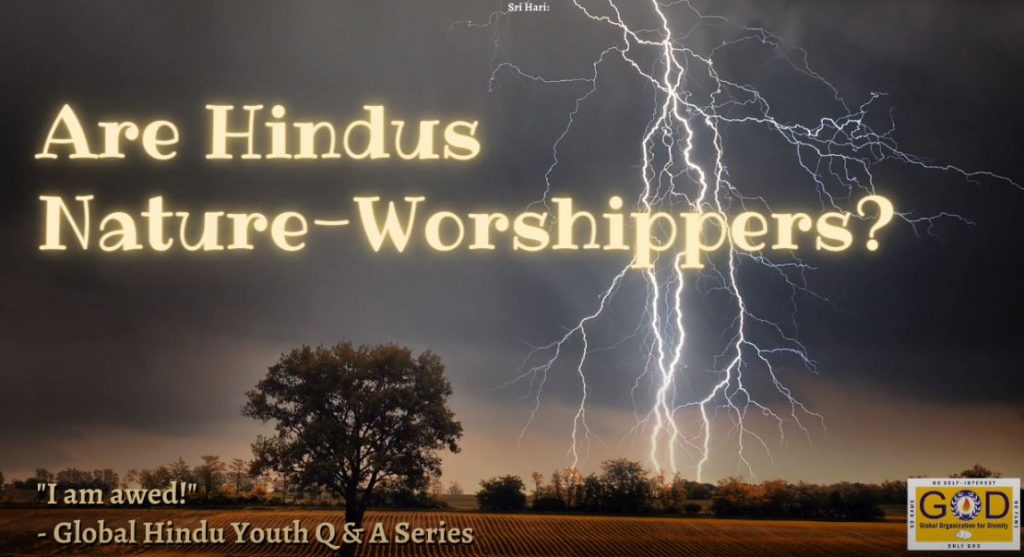Madhura Geetham – Sloka Series
“Athichoodi” is a type of poetic work (in Tamil) that comprises of a collection of one-line philosophical verses. HH Sri Sri Muralidhara Swamiji has composed a “Vedanta Athichoodi”, a poetic work that speaks of life’s most important principles. We had published the entire Vedanta Athichoodi and its overall meaning as part of our Madhura Geetham Sloka Series, earlier this year. Read that article here.
Each of the lines of this Athichoodi is extremely deep and contains a wealth of meaning. In our sloka series over the next few months, we will look at the meaning of each line of this work.
Aushadamam Bhagavan Namam! – The Lord’s Name is the Medicine
In this verse Sri Swamiji says that the Lord’s name is “aushadham” or medicine. What disease or suffering does Sri Swamiji allude to here that we need relief from?
 To understand a Mahan’s work, we need to look at his other teachings or the teachings of other Mahans. In another kirtan, Sri Swamiji sings, “…bhava bhayam pokki mukti nalgidum, sulabha nAmam umakke uriyadanDro.” (O Lord, it is only Your Name that can easily remove the fear of this world that is wrought with an endless cycle of life and death, and grant liberation!)
To understand a Mahan’s work, we need to look at his other teachings or the teachings of other Mahans. In another kirtan, Sri Swamiji sings, “…bhava bhayam pokki mukti nalgidum, sulabha nAmam umakke uriyadanDro.” (O Lord, it is only Your Name that can easily remove the fear of this world that is wrought with an endless cycle of life and death, and grant liberation!)
Sri Adi Shankaracharya too says in his famous work, Bhaja Govindam, “punarapi jananam, punarapi maraNam, punarapi janani jaTare shayanam, iha samsAre bahu dustAre, krupaya pAre pAhi murAre!”. This endless cycle of life and death is so difficult to cross that Sri Adi Sankaracharya prays to the Lord to bestow liberation.
If this is how Mahan’s like Sri Swamiji and the preceptor of Advaita, Sri Adi Shankaracharya, feel about this samsara or bhava, what can we then say about ordinary householders like us? We do not possess the mental strength nor the dispassion to renounce our current way of life nor do we find time to practice intense spiritual discipline.
Our scriptures say,
“kalau kalmasha chittAnAm pApa dravyOpa jIvinAm |
vidhikriyA vihInAnAm gatir gOvinda kIrtanam ||”
In Kali Yuga, the minds of men will be fickle and maligned, and sins a way of life; the only way to salvation is singing the names of the Lord.
The path is simple and easy but the fruit it bestows is lofty. It can bestow both earthly wishes and higher ideals (maNNulaga AsaigaLum, viNNuluga AsaigaLum…).
The names of the Lord are like an umbrella in a heavy rainfall. When there is heavy rain, we do not stop our routine. Instead, we just take an umbrella and go about our work. Similarly, we can go about our routine with the Lord’s names on our lips as a protection.
Sri Purandaradasa sings in the kirtan Narajanma bandAga about how singing the names of the Lord can be part of our everyday activities. He sings, “malagiddu maimuridELuttalomme….suLidADuta maneyoLagAdaruomme……shAlyAnna shaDrasa tindu truptanAgi krishNa enabArade” (When you wake up… or walking in the house… or eating a sumptuous meal…, sing the names of the Lord). “krishNa endare sakala kashTavu parihAra krishNa enabArade” (When you sing, all your problems will be solved, won’t you say ‘Krishna’?)
When Draupadi was being humiliated in the court of Duryodhana, nobody came to her rescue. When everything and everyone failed her, all she could do was lift her hands and cry out, “Govinda.” The Lord immediately protected her. Similarly, when Gajendra called out to the Lord, He came and liberated Gajendra from the clutches of the crocodile. Not after an hour or 24 hours, but that very instant! (tat kshanAth). Sri Swamiji sings in a kirtan, “tat kshana rakshaNa nAma vaibhava”. The Lord’s Name protects one instantly!
Saint Narayana Tirtha, who composed Krishna Leela Tarangini, a set of songs that describe the leelas of Lord Krishna sings, “Rama Krishna Govindeti, Nama sam prayoge, kAmamiha snAtavyam sarvOttama prayAgE”. Just as we have Prayag in India, where the holy rivers Ganges, Yamuna, and Saraswati meet, similarly the names Rama, Krishna and Govinda are a Nama Prayag. Immersing oneself in these Names yields the same benefit as taking a dip in the holy rivers.
Further, he adds, “dikdEsha kAlAnapEksha siddhi sarva sulabhE, sadguru krupAsamudra sanga hEtu lAbhE” There are no rules for chanting these Names (like the right direction, time, etc) and it is extremely simple. It will even bestow the greatest boon of all – the company of a Sadguru. When one attains the satsang of a Guru, the Guru then takes charge of the disciple’s wordly as well as spiritual life.
Srimad Bhagavata Mahatmyam says:
chintAmaNir-lOka-sukham suradruhu swarga sampadam
prayacchati guruhu preeto vaikunTam yOgi durlabham
The Chintamani gem (philosopher’s stone) can fulfill only our worldly desires; the Kalpakavruksha (wish-fulfilling tree) can give us even the comforts of heaven but no more; however, the highest abode of Vaikuntam, which is rare even for Yogis, is attained by one who has earned the affection of the Guru!
Just as a fire provides both heat and light, the Lord’s Name can grant us the mundane needs of our daily life as well as bestow the loftiest – Bhakti and Mukti! All we have to do is carry the Names on our lips. Can it become any easier?
Sowmya Balasubramanian, Dallas TX





